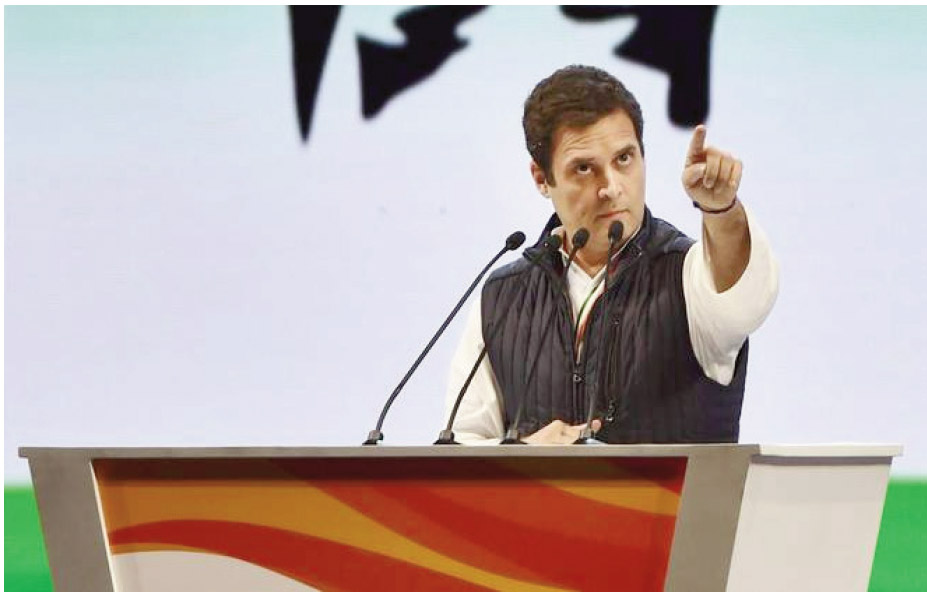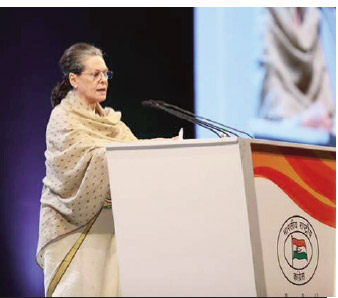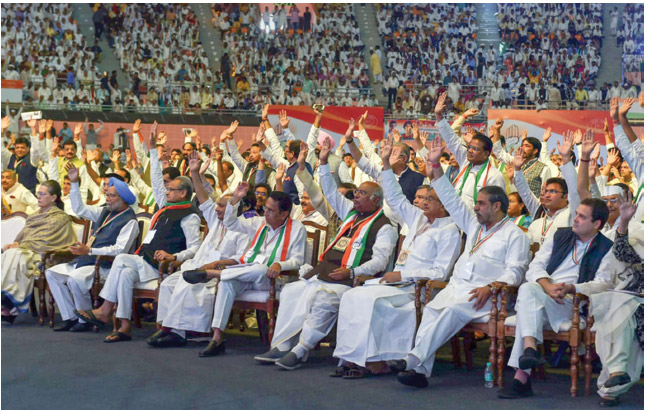A hard task ahead
for Rahul Gandhi
Hari Jaisingh
 Should we expect the
emergence of a new face
of the Congress after its
84th plenary session in
New Delhi? I prefer to
keep my fingers crossed,
even though the party has sent out
a clear signal of change – the
change of a generational shift at
the top to mark Rahul Gandhi
taking over the reins of power. Even
the theme of the plenary was
"Waqt badlav ka" (it is time of
change).
Should we expect the
emergence of a new face
of the Congress after its
84th plenary session in
New Delhi? I prefer to
keep my fingers crossed,
even though the party has sent out
a clear signal of change – the
change of a generational shift at
the top to mark Rahul Gandhi
taking over the reins of power. Even
the theme of the plenary was
"Waqt badlav ka" (it is time of
change).
The change, per se, demands new policies and strategies in tune
with changing ground realities and
expectations of the new generation
of the electorate. Equally critical is
the change of mindset and style of
functioning which has reduced the
grand old party, both electorally
and public perception, now
virtually just a regional force
confined to four states. Thus, for
the new Congress President, this
will be a tall order which cannot be
met by rhetoric and pursuing the
politics of negativism.
True, the country's overall political setting today looks quite
receptive to yet another change
after four years of Prime Minister
Narendra Modi's somewhat belowexpectation
performance. Still, we
cannot write off the BJP-led NDA
establishment's possible return to
power in 2019.
 Narendra Modi is a Master
Magician. Though his credibility has
suffered, his popularity graph still
runs high. A lot will now depend on
whether the Modi-Amit Shah
leadership is able to draw the right
lessons from the setback it has
suffered by losing 10 parliamentary
seats in recent by-elections in their
stronghold states of UP, Rajasthan,
Madhya Pradesh. However, this is
what has infused a new lease of life
among the opposition parties, the
Congress included.
Narendra Modi is a Master
Magician. Though his credibility has
suffered, his popularity graph still
runs high. A lot will now depend on
whether the Modi-Amit Shah
leadership is able to draw the right
lessons from the setback it has
suffered by losing 10 parliamentary
seats in recent by-elections in their
stronghold states of UP, Rajasthan,
Madhya Pradesh. However, this is
what has infused a new lease of life
among the opposition parties, the
Congress included.
Sonia Gandhi, who stepped
down as the Congress President in
December last year, has struck a
note of optimism. She has set a
new tone for the party. Realising
that the Congress has still a long
way to go for its revival, she has
talked about "pragmatic approach
for cooperation with all like-minded
parties" and "a common workable
programme" against the BJP in the
2019 elections. Even young
Congress chief Rahul Gandhi has
indicated that the party would
evolve itself as "a mix of young
blood and elders". He said that "my
task is to unite the seniors and the
youth and give the party a new
direction". Going by the party's
track record, it is easier said than
done.
The Congress, over the years,
has been a personality-oriented
party. It has invariably drawn its
strength from the dynasty – the
dynasty of Nehru, Indira Gandhi
and Sonia Gandhi. Today it is no
longer an all-inclusive umbrella
because of its shrinking support
base following a virtual eclipse of
its old-world Sewa Dal spirit. The
Sewa Dal as an institution of
voluntary cadre is no longer a force
to reckon with. Besides, the party
Sonia Gandhi, who
stepped down as the
Congress President in
December last year, has
struck a note of
optimism. She has set a
new tone for the party.
Realising that the
Congress has still a long
way to go for its revival,
she has talked about
"pragmatic approach
for cooperation with all
like-minded parties"
and "a common
workable programme"
against the BJP in the
2019 elections.
has paid a heavy price for pursuing
opportunistic policies and
misplaced strategies to the
advantage of the saffron party.
Small wonder, Sonia Gandhi now
grumbles about the BJP calling the
Congress a Muslim party. Her son is
now trying to erase that impression
by his temple yatra during election
campaigns.
The main challenge in the
evolution of the right kind of
leadership in the Congress has
been the personalized factor and
not as "an institution" working on
democratic principles, both in the
example it sets and the model it
creates for the rest.
Take the case of the latest
plenary session of the party. As in
the past, it has authorized Rahul
Gandhi to fill all the top slots for
various panels to the President.
Why could they not be elected
democratically? Rahul Gandhi, after
all, lacks the standing of Nehru and
Indira. Even otherwise, internal
democracy within the party
functioning cannot be established
unless it discards personalized
factors which gave rise to
sycophancy culture, which was
once identified by Rahul Gandhi as
one of the reasons for the Congress
decline.
The personalized political
culture has actually brought to the
forefront a set of leaders who
thrived on personal loyalty and
sycophancy. Loyalty before merit
guided the working of Indira
Gandhi. No wonder, there was a
mushroom growth of leaders at
different levels, who got
themselves established by
swearing loyalty to Indira Gandhi.
This vitiated the political
atmosphere and gave rise to
second and third rate leaders, apart
from driving away those who were
really competent and honest.
Not that there is a dearth of
talented young leaders in the party.
But they have to be given a pride of
place within the Congress panels.
Herein lies the challenge for Rahul
Rahul Gandhi took to the path of negativism and
launched his sharpest personalized attack on
Prime Minister Modi and BJP chief Shah. He said
Narendra Modi's name has come to symbolize the
"collusion between India's biggest businessmen
and the PM. He also called Shah as a "murder
accused."
In the 2019 poll
battle, the Congress
cannot win on its
own. It has to firm up
ties with like-minded
parties with a
common minimum
programme. It will
not be the battle of
truth v lies or "Pandavas" v. "Kauravas". No
party in the country
today is clean and
transparent.
 Gandhi. If he means business, he
has to create a climate of trust,
provide the party the old idealistic
fervour, strengthen its organization
base at the grassroots with a
freshness of approach and drive.
He needs to remember that myopic
strategies and a negative brand of
politics would only make a mockery
of all idealism.
Gandhi. If he means business, he
has to create a climate of trust,
provide the party the old idealistic
fervour, strengthen its organization
base at the grassroots with a
freshness of approach and drive.
He needs to remember that myopic
strategies and a negative brand of
politics would only make a mockery
of all idealism.
In contrast to his mother's
principled speech at the plenary,
Rahul Gandhi took to the path of
negativism and launched his
sharpest personalized attack on
Prime Minister Modi and BJP chief
Amit Shah. He said Narendra
Modi's name has come to
symbolize the "collusion between
India's biggest businessmen and
the PM. He also called Amit Shah as
a "murder accused", indicating it would be a no-holds barred faceoff
in the election year. I doubt if this is
the right strategy for the new
Congress chief. He has to be
positive before the party his
concrete plan of action, especially
spelling out how he proposes to
rebuild the party from the ground
upwards democratically. He should
also work out new strategies and
the direction in which he would
take the party forward in today's
complex and multi-dimensional
politics vis-à-vis BJP.
It is clear that in the 2019 poll
battle, the Congress cannot win on
its own. It has to firm up ties with
like-minded parties with a common
minimum programme. So, 2019 will
not be the battle of truth v lies or
"Pandavas" v. "Kauravas". No party
in the country today is clean and
transparent.
As it is, populism has become a
curse in a developing democratic
polity like ours. And competitive
populist postures have only created
false hopes, diverting the country's
attention away from harsh realities
and hard options to put the country
on the right tract of development
from the grassroots upwards.
Here
we must appreciate that slogans
cannot be a substitute for action.
If Rahul Gandhi means business,
he has to strike different notes in
tune with the young generation's
new hopes and aspirations. Indeed,
India's socio-economic scene calls
for new responses and demands
positive thinking and constructive
action, away from the politics of
violence and intolerance. Equally
vital is the tasks of reconciliation
and mutual understanding. Finally,
we ought to turn India into a land
of opportunity with a system of
transparency and accountability.
Will Rahul Gandhi prove to be
different from Narendra Modi? It is
up to him to prove himself as a new
breed of 21st century forwardlooking
leader. Well, he has a long
way to go.






